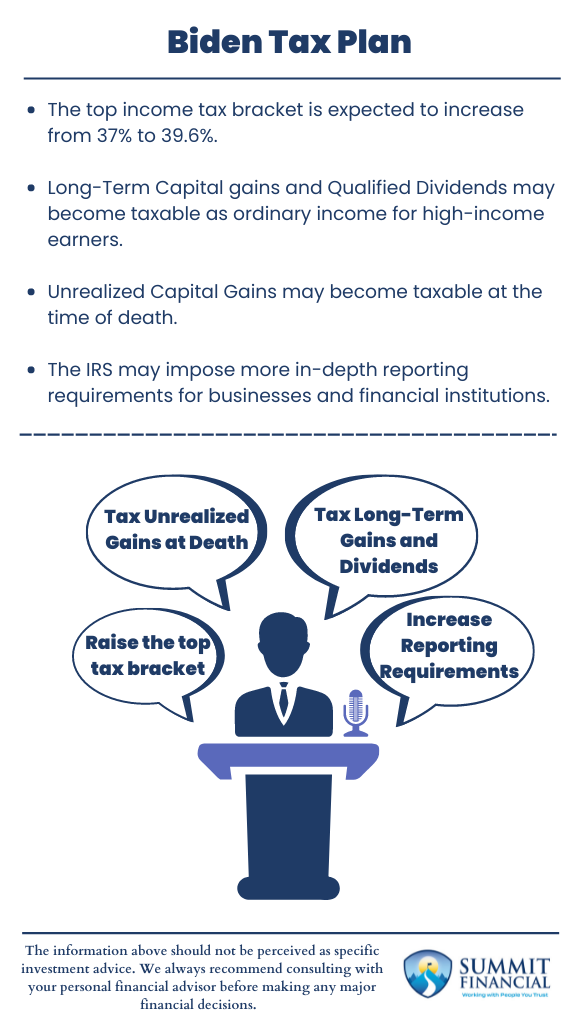President Biden’s election campaign focused heavily on the potential for tax reform. President Biden promised that income taxes should not increase for the lower or middle class throughout the campaign. Although the government has failed to pass any official tax reform, it seems we are inching closer to implementation.
Since there is a chance these changes may be in force by the end of 2021, we will outline the expected implications of Biden’s tax plan below.
Proposed Increase in the Top Income Tax Bracket
Sticking with his original promise, President Biden will only be adjusting the very top income tax bracket. Currently, this income tax rate is 37%. We expect the increase would take this top bracket to 39.6%. Based on the 2021 brackets, this change will only affect single individuals who report income above $523,600 and married couples with income above $628,300.
Changes to Long-Term Capital Gains and Qualified Dividends Taxation
Another significant change to the tax law would affect how long-term capital gains and qualified dividends are taxed. Currently, Long-Term Capital gains and Qualified Dividends are taxed at a preferential rate, with the top bracket being at 20%. As a result, taxpayers with over $1,000,000 in income may be forced to pay ordinary income taxes on these types of income. This could create a tax increase from 20% to 39.6%.
Once again, no changes are expected for lower-income earners, especially those earning less than a million per year. To dive deeper into these topics, check out our recent articles on Long-Term Capital Gains and Qualified Dividend.

Enhanced IRS Reporting Requirements
There is also the potential for unrealized capital gains above $1,000,000 to become taxable at the time of death. The current tax law allows unrealized gains to be passed to beneficiaries, receiving a step-up in basis.
This prevents the government from obtaining the tax revenue from all the gains that occurred. This potential tax change would increase tax revenue and decrease the amount of inheritance individuals will receive. This certainly affects how some individuals or families will want to plan their estates.
Still, this change would only affect unrealized gains over one million, similar to the gains/dividend change mentioned above.
How to Stay Prepared for Potential Tax Changes
Lastly, we wanted to touch on the potential reporting requirement changes. The concern is that a large amount of tax revenue is lost due to underreported income.
As a result, the government may require enhanced reporting requirements from businesses and financial institutions to track cash flow better. There have not been many descriptions of these requirements, but it is likely the IRS will receive additional funding to set up this tracking and reporting process.
Key Policies of Biden’s Tax Plan
- The top income tax bracket is expected to increase from 37% to 39.6%.
- Long-Term Capital gains and Qualified Dividends may become taxable as ordinary income for high-income earners.
- Unrealized Capital Gains may become taxable at the time of death.
- The IRS may impose more in-depth reporting requirements for businesses and financial institutions.
Financial Planning and Review Meeting
If you have any questions about taxes, your individual investment portfolio, our 401(k)-recommendation service, or anything else in general, please give our office a call at (586) 226-2100.
Please feel free to forward this commentary to a friend, family member, or co-worker. If you have had any changes to your income, job, family, health insurance, risk tolerance, or overall financial situation, please contact the Team at Summit Financial. We hope you learned something today.
If you have any feedback or suggestions, we would love to hear them.
Best Regards,
Zachary A. Bachner, CFP®
with contributions from Robert Wink, Kenneth Wink, and James Wink
Sources:
- Erica York, Tyler Parks, Alex Muresianu, “Tracking the 2021 Biden Tax Plan and Federal Tax Proposals”, taxfoundation.org, Tax Foundation, 06/16/2021, 08/13/2021.
- Greg Iacurci, “Higher taxes for the rich edge closer as Democrats pass $3.5 Trillion budget outline”, cnbc.com, CNBC, 08/11/2021, 08/13/2021.


